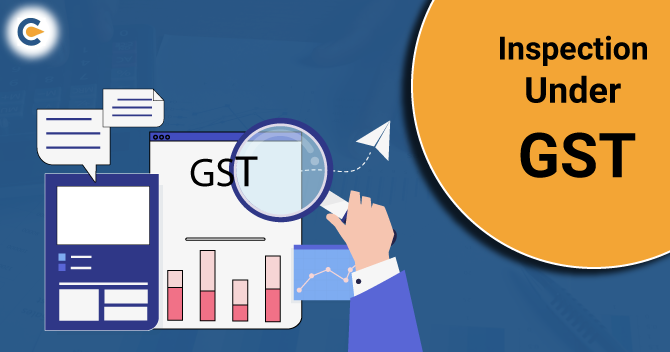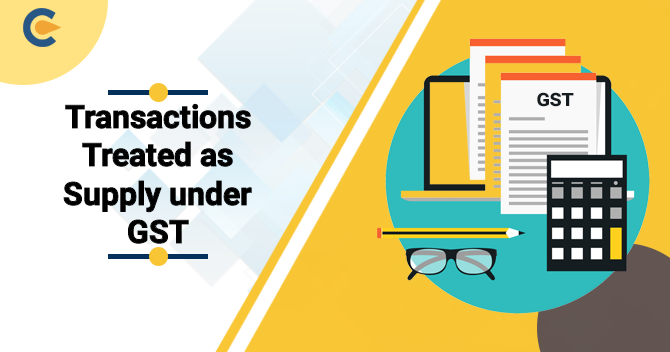The Goods and Services Tax (GST) is an indirect tax which has replaced the various indirect taxes which were being levied upon the citizens. The GST Law was passed on 29th Match, 2017 in the parliament and came into effect on 1st July, 2017. There are three taxes applicable under this system- IGST, CGST, SGST, UTGST. Under the GST Registration Process businesses with an aggregate turnover of more than 40 or 20 lakhs in case of supply of goods and 20 or 10 lacs for supply of services are bound under the act to register under GST as a normal taxable person. Let us first understand the meaning of Inspection under GST:-
The term “Inspection” in common terms means careful scrutiny. Under the CGST Act, there are various provisions which deal with inspection, search and seizure of records of taxpayers for proper analysis of tax payment as well as to prevent evasion of tax. Moreover, Section 67 to 72 of the CGST Act deals with the provisions of inspection enabling the procedure, thereby, the reason and outcomes of conducting an inspection and the same are explained below:-
Read our article:How to apply for GST registration certificate online?


Conditions Where Inspection under GST Can Be Conducted
Under the CGST Act, a joint commissioner or an officer of a higher rank can carry out an inspection if has sufficient cause to believe that the tax payer has done either of the following to evade taxes:-
- Any transaction of supply is hidden by the tax payer.
- Any stock is hand is hidden.
- The Input Tax credit (ITC) has been availed in excess.
- Has done something that is in contravention with the provisions of GST.
- The accounts book have been maintained in a manner to evade taxes.
- Any transporter or warehouse operator is found to be hiding goods without the payment of GST on them.
In any of these cases mentioned above, the Joint Commissioner or any person higher in rank can issue authorization for any person subordinate to him allowing him to conduct an inspection of the books of that particular tax payer. The authorization in this case is issued in FORM GST INS-01.
Places and People who can Inspected under GST
Under the CGST Act the joint commissioner or any other person of a higher rank can issue an authorization to any person to conduct an inspection of any place of business related to the following persons. Those are as follows:-
- The person who pays the taxes
- The operator of the warehouse
- The transporter
The power to inspect only extends till inspection of any place of business. The place of business has been explained in the CGST Act under Section 2(85) and are those places where the taxpayer conducts business, or keeps his books of accounts. Now, if the said books are kept at the residential address of the taxpayer or any other person who is key-managerial personnel then the inspection can be conducted at these residential places.
Reasons to Believe for Inspection under GST
Under Section 67 of the CGST Act[1], the power to conduct an inspection is granted to an officer if he has sufficient “reason to believe” that the taxpayer is fraudulent. Reasons to believe here means that having factual knowledge of some malpractice through which a reasonable person can conclude that there is something fraudulent being done by the taxpayer.
The law does not explain in writing sufficient grounds for “reason to believe” however, there are similar provisions under Section 132 of the Income Tax Act which were relied upon by the Honorable Supreme Court in the case of “ITO vs Lakhmani Mewal Das”. The SC observed that the reasons for conducting inspection must not be merely on pretense and should be conducted in good faith.
The basic principles for ascertaining the grounds for “reason to believe” are:
- There must be some information in possession of the authority according to which an opinion for “reason to believe” can be formed.
- The opinion that is formed should rely on some material information and not irrelevant facts.
- The court should form a rational connection between the material relied upon and the opinion formed.
Difference between Search and Inspection under GST
These two words are used as synonyms more often, but under the CGST Act these two words have different meanings and are to be conducted in different conditions after fulfilling a different set of conditions.
Search is an action conducted by a tax official or a police official, depending upon the case at hand; to scrutiny a person, place or object to find any sort of evidence which support any crime which was committed. Under the CGST Act only a valid authority can conduct a search proceeding. Inspection on the other hand this provision allows any fit authority to inspect any place of business of a fraudulent tax payer.
Conclusion
These provisions are laid down to ensure the smooth functioning of the tax system in the country and punishing those who tend to disrupt this ongoing flow. If the commissioner finds reasons to believe for Inspection under GST and the provisions under Section 132 of the CGST Act are satisfied then the fraudulent taxpayer can be arrested. It is vital to have stringent provisions for punishing those who do not comply with the required provisions and make the tax flow system a rusty one.
Read our article:CBIC directs to clear pending GST registration under special drive











